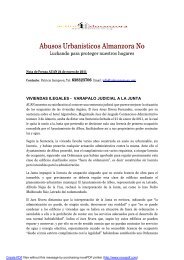European Property Rights and Wrongs - Diana Wallis MEP
European Property Rights and Wrongs - Diana Wallis MEP
European Property Rights and Wrongs - Diana Wallis MEP
Create successful ePaper yourself
Turn your PDF publications into a flip-book with our unique Google optimized e-Paper software.
A lawyer equipped to h<strong>and</strong>le the first aspect may not do well with the second.<br />
In many Spanish ‘l<strong>and</strong> grab’ cases the second aspect predominates <strong>and</strong> some<br />
at least of the buyers were not made aware of the potential infrastructure costs.<br />
Conveyancing is compartmentalised because property transactions <strong>and</strong> probate<br />
can be, <strong>and</strong> invariably are, reserved for notaries recognised nationally. In the<br />
short term this is the single biggest factor militating against the emergence of a<br />
single Europe-wide property law. UK law firms are much more anxious to embrace<br />
change, believing that wider markets means more business not less. The EU treaties<br />
enshrine the monopoly of national notarial professions <strong>and</strong> this precludes the<br />
emergence of a single market in legal probate <strong>and</strong> conveyancing services. The<br />
Spanish experience shows how unsatisfactory this can be. Spanish notaries advised<br />
buyers according to Spanish professional st<strong>and</strong>ards, <strong>and</strong> yet the information<br />
supplied was clearly inadequate to the needs of many foreign buyers. In the long<br />
run, the notarial monopoly is as unsustainable as the monopoly over conveyancing<br />
once enjoyed by high street solicitors in the UK, <strong>and</strong> the ultimate solution is<br />
the <strong>European</strong> conveyancer. This new profession cannot emerge under current EU<br />
law, but the Valencian saga suggests that this matter is urgent.<br />
Towards a wider <strong>European</strong> l<strong>and</strong> law<br />
L<strong>and</strong> law is essentially a matter for each Member State. Three processes seem<br />
to be at work to create a <strong>European</strong> l<strong>and</strong> law. (1) There is a gradual evolution<br />
of a <strong>European</strong> transactional law as a response to the large volume of crossborder<br />
purchases. (2) An increasing convergence of property systems operating<br />
within the same basic traditions, but that this form of soft harmonisation cannot<br />
overcome the basic structural dislocations between the common law, French,<br />
Germanic <strong>and</strong> Nordic systems. A particular driver is the evolution of computerised<br />
registration systems <strong>and</strong> efforts to ensure their mutual compatibility. (3)<br />
Moves towards a common contract law which might include a <strong>European</strong> code<br />
for the passing of property when goods are bought <strong>and</strong> sold. A proposal is circulating<br />
in the shape of the Draft Common Frame of Reference, though it seems<br />
unlikely that there is the political will for its adoption <strong>and</strong> it is extremely unlikely<br />
that the UK would participate in even the mildest reworking of this proposal. .<br />
Any move to harmonise contract law calls for a knock on reform of l<strong>and</strong> law.<br />
L<strong>and</strong> would be excluded but it is by no means easy to draft an adequate exclu-<br />
33



